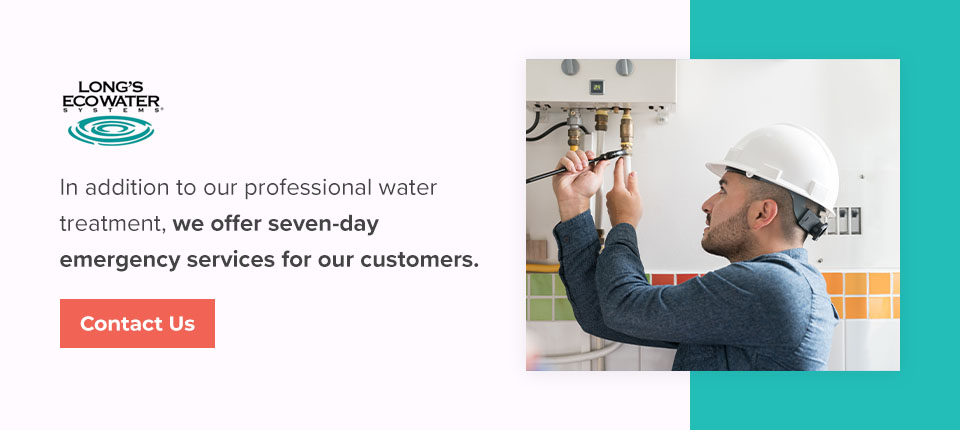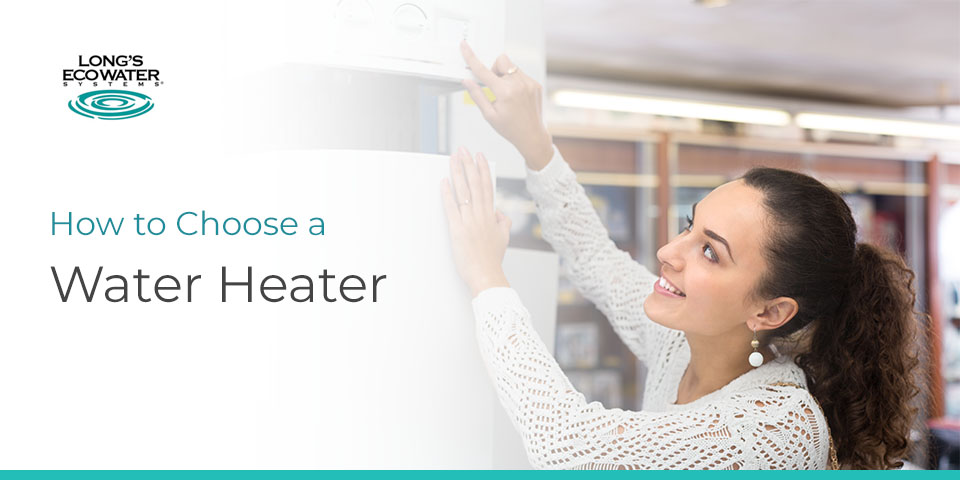
A reliable water heater is essential for any home. Hot water lets you shower, wash dishes and clean clothes and ensures you live comfortably. As the second-largest energy consumer in your home, costing around 20% of your utility bills, your water heater should fit your budget, meet your household needs and operate efficiently to help save you money.
To help you understand the different options and features for hot water, review this guide to learn more about choosing a water heater for your home.
Finding the Right Water Heater
When selecting the best water heater, you’ll want to consider more than just the type. Understanding the factors that can affect your water heater will help you make a better, more informed choice. While looking at water heaters, keep in mind:
- Efficiency: Some units and fuel types are more efficient. The better your heater’s energy efficiency, the more money you’ll save. Use Energy Star ratings and other guides to determine the most efficient options.
- Fuel: The cost and fuel availability will change depending on your location. Find out what’s affordable and accessible in your area when choosing heaters.
- Size: Estimating your water usage will help you find the right size tank for your household. If the model is too big, you’ll overspend on heating water you don’t need. However, you’ll run out of hot water during peak hours if it’s too small.
- Cost: Everyone’s budget is different. Finding operating and purchasing estimates before buying a unit will help you search. Some water heater costs include installation, tank size, fuel type, extra features and maintenance fees.
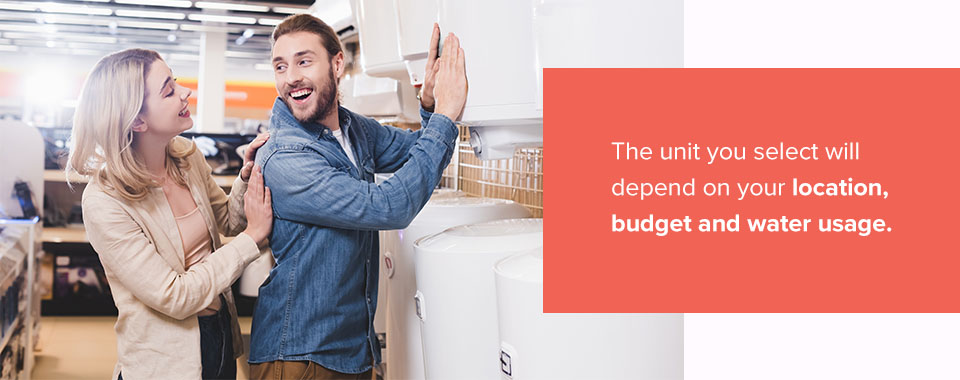
Types of Water Heaters
Several different types of water heaters are available. The unit you select will depend on your location, budget and water usage. Before purchasing, understand the costs and benefits of each heater type to find the best option for your house.
Storage Tank Water Heaters
The most common type of water heater, these tanks keep a full supply of water heated at all times, so you have hot water ready whenever you need it. When using the tank, hot water leaves from the top, while cold water comes in the bottom to fill the tank again. They can hold 20-80 gallons of water, so you can select the size that meets your hot water requirements.
Storage tank heaters can use propane, fuel oil, electricity or natural gas as fuel sources, making them convenient and versatile. However, they aren’t as energy efficient as tankless water heaters. Since water is constantly heated in the tank, units continually use power to counter standby heat loss. One way to reduce standby heat loss is by insulating your storage tank so heat stays inside the unit longer.
With a life expectancy of 10-15 years and a low purchase cost, conventional storage water heaters are affordable and convenient for many homes.
Heat Pump or Hybrid Water Heaters
Instead of directly generating heat, heat pump water heaters use electricity, natural gas or geothermal energy to pull heat from the air and transfer it at higher temperatures to water in a storage unit. This technology makes heat pump or hybrid heaters two to three times more efficient than storage heaters. These heaters come as stand-alone units or fit onto an existing storage tank.
Since heat pumps pull heat from the nearby air, they need to sit in locations that remain 40-90 degrees Fahrenheit year-round. Placing them in warmer areas, like furnace rooms, can increase their efficiency.
Heat pumps are more expensive than storage tanks but also more energy-efficient. They have a life span of 10-15 years. The long-term savings from these systems can help offset the unit’s initial cost.
Tankless Water Heaters
Tankless or on-demand water heaters instantly heat cold water using an electric element or natural gas burner without needing a storage tank. With no water storage, flow rates limit tankless heaters, and many hot water uses at the same time can restrict the heater’s ability. Installing multiple tankless heaters can help meet water demands in the household, preventing this issue from occurring.
Tankless water heaters have a higher upfront cost than storage tanks but are 8%-30% more efficient since they don’t experience standby heat loss. They can also last 20 years and have easily replaceable parts, making them a cost-effective choice for households that use less water.
Solar Water Heaters
Solar water heaters can work in any climate, and their use of sunlight means their fuel source is free, making them a cost-effective option in the long run. There are two types of solar heating systems — passive and active — which use different methods to move water through the system. Most solar water systems require a backup, insulated storage tank for cloudy and high-demand periods.
Solar heaters have significant upfront costs, making them a big investment for most households. However, the units are up to 50% more efficient than electric or gas heaters and can have 20-year life spans when adequately maintained.
These are not the only water heaters on the market. Indirect and tankless coil water heaters are available, which use a storage tank and your home heating system to work. Indirect systems are often more expensive than a storage tank and are typically inefficient in warmer climates. They can be efficient when paired with insulated storage tanks and warmer temperatures.
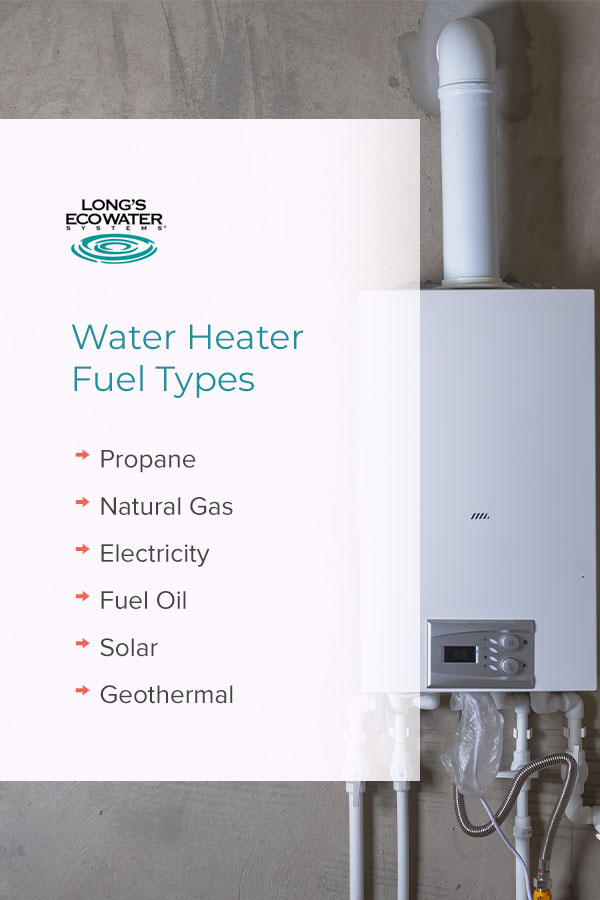
Water Heater Fuel Types
When choosing water heaters, you need to consider size, efficiency and cost, and you’ll want to look at fuel types available in your area. Household location and energy budget can affect the best fuel type for your home, influencing the kind of water heater you select. Fuel type will influence your heater’s energy efficiency, size and operating costs, making it a crucial feature to consider.
Standard fuel options for water heaters include:
- Propane: Propane is available across the United States and can power tankless, storage and indirect units.
- Natural gas: Natural gas is also widely available in the U.S. and works with tankless, storage, heat pump and indirect heaters.
- Electricity: Another widespread energy source, electricity can power tankless, storage, heat pump and indirect models.
- Fuel oil: An option in some locations in the U.S., this fuel works with storage and indirect heaters.
- Solar: Solar energy works best in sunny areas like the Southwest but can work in most U.S. zones.
- Geothermal: Housing with or planning to get geothermal heat pumps for cooling and heating their homes can get geothermal energy for their heat pump water heaters.
Fuel usage will affect your yearly costs, but you should also consider the expenses around installing a fuel source. Running a gas line and adding a breaker could be extra costs associated with fuel. Also, some water heaters run more efficiently with electricity than with natural gas, so even if natural gas is cheaper in your area, electricity might be less expensive long term. Check utility rates in your area for help with estimating fuel costs.
Water Heater Sizing
Figuring out your water needs will allow you to select the correct sized unit for the household. A heater that is too small will not provide all the hot water you use during periods of high demand. The larger the size of your heater, the higher your costs, so it’s essential to find the perfect fit for the house. Storage tanks measure capacity in gallons, while tankless units use a flow rate in gallons per minute (GPM), so calculate the water usage based on your unit type.
For a quick size estimate, use this guide:
- One to two people: 20-30 gallons or 2-3 GPM.
- Three to four people: 30-50 gallons or 3-5 GPM.
- Five or more people: 50+ gallons or 6 GPM or higher.
The capacity requirement will change depending on location and household water usage, so accurately determining your needs will help fit your water heater to your home. The following sections can help you calculate your water needs for storage or tankless heaters more accurately.
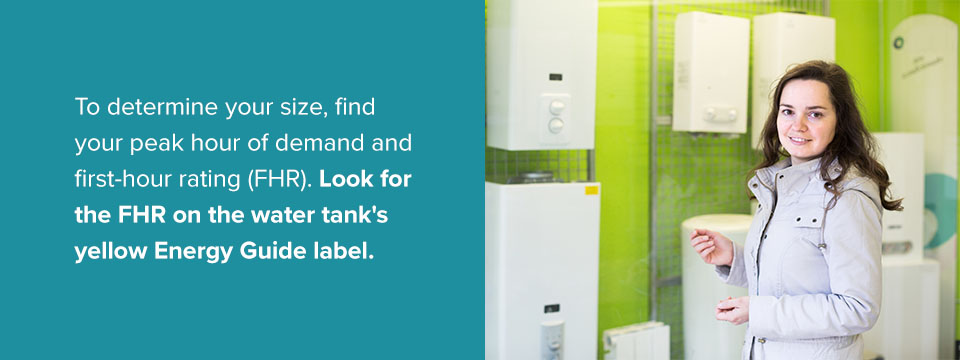
Storage Tank Heater Sizing
Storage tank heaters generally come in sizes of around 30, 40, 50, 55 and 75 gallons, but you can find tanks that hold anywhere from 20-80 gallons of water. To determine your size, find your peak hour of demand and first-hour rating (FHR). Look for the FHR on the water tank’s yellow Energy Guide label. This number represents the maximum gallons of hot water the unit provides in one hour. If you find yourself running out of hot water often, it means you’re exceeding the FHR and should get a larger tank.
Once you have the FHR, it’s time to do some math. This involves estimating the highest amount of water used in your house in one hour. Determine when your household uses the most hot water, and find all the water appliances you use during that time. Reference Energy Saver’s peak hour of demand chart to estimate the number of gallons of hot water used in your peak hour. Match that number to the FHR on your desired water heater to pick your home’s right storage tank size.
Tankless Heater Sizing
Since tankless water heaters use flow rate instead of tank size, finding the amount of water you use is more complicated. To find the GPM, you’ll have to take the following measurements:
- Peak hour of demand: Find your peak hour of water usage and count the number of water fixtures, like showerheads, dishwashers, laundry and faucets, that you use during this time.
- Flow rate: Find the flow rate of each fixture. The flow rate should be in the manufacturer’s guide for each device. If you don’t have the manual, place a large pot, bowl or container underneath the fixture, and run water from it for one minute. Measure the amount of water and multiply it by 60. That is your flow rate for one hour for that fixture.
- Max GPM: Calculate the maximum GPM for your house by adding up the flow rates of all devices used during the peak hour of demand.
- Temperature rise: To find the temperature rise, run cold water from a faucet and use a thermometer to take its temperature. Subtract that number from 120, the recommended degrees Fahrenheit for most water uses.
With your temperature rise and maximum GPM, you can choose the best tankless model size for your water needs.
Increase Water Heater Efficiency
Improving your water heater’s efficiency helps reduce expenses and can increase the life of your unit. Along with scheduling regular, professional maintenance, use these tips for better heater efficiency:
- Use less hot water.
- Check for leaks regularly.
- Purchase an energy-efficient heater.
- Turn water heaters off before vacations.
- Install low-flow faucets and showerheads.
- Use factory recommendations and settings.
- Install quality insulation in water storage tanks and pipes.
Maintaining Your Water Heater
Keep your water heater running as long as possible with routine care and upkeep. Water hardness, changing seasons and other issues can affect water heater health. Preventing plumbing issues with regular maintenance saves you time and costly repairs. While different water heater types may have various issues, avoid common problems by:
- Regularly looking for leaks.
- Flushing the heater yearly.
- Using factory recommendations and settings.
- Scheduling routine inspections by a licensed professional.
- Checking heater temperature and pressure valve every six months.
- Inspecting storage tank anode rods every one to two years and replacing them when needed.
Hard Water Damage in Water Heaters
Homeowners in Pennsylvania and other areas can experience issues from hard water. Hard water leads to scale accumulation, which lowers the efficiency of gas storage and tankless water heaters. Mineral build-up from hard water can also decrease the life span of your unit, causing you to spend money on new water heaters and repairs more frequently. Here are some ways to reduce the effects of hard water:
- Purchase storage tanks made from noncorroding material.
- Regularly delime tankless units according to manufacturer guides.
- Lower the tank temp or tankless temp setpoint and reduce water use.
- Drain tanks yearly to remove sediment build-up, and delime when needed.
Water Softeners for Water Heaters
One way to help mitigate the effects of hard water on gas storage and tankless water heaters is by installing a water softener. For electric storage water heaters, softeners can protect against the effects of hard water on other house fixtures and help with water taste. Choosing the right water softener can help remove water hardness and sediment, preventing scale build-up in water heaters and improving the efficiency of your unit.
Water Heater Inspections
If you are moving into a home or looking at a new house, keep a checklist to evaluate the water heater for potential issues. This saves you from dealing with expensive fixes once you’ve moved in and can prepare you for using hot water in the house. When checking out a water heater, watch for:
- Heater size: Is the water heater large enough for your family’s water needs? If not, you’ll want to consider purchasing a larger unit or adding another so you have enough hot water.
- Inspection dates and age: Well-maintained models can last for 15-18 years, depending on the type of heater. Check the unit’s age and its last inspection date. If an inspection hasn’t occurred in the previous six months to a year, it might signify a poorly-maintained heater.
- Location: Water heaters should be installed away from essential sites to prevent damage to the rest of the house. It should also be somewhere you’re comfortable going for routine inspections and checks.
- Visual indicators: Look at the heater and temperature and pressure valves for corrosion, rust, burn marks and leaks. The temperature should be set at 120 degrees Fahrenheit or lower for efficiency and safety.
In addition to going over your checklist, you should have a licensed technician inspect the unit to ensure it’s up to code and in good condition. This protects you from heater problems and safety issues once you own the house.
When to Replace Your Water Heater
While well-maintained water heaters can last for years, regularly check for issues, and replace units when they’re no longer effective. You don’t want your water heater breaking down when you need it, so a professional inspection if:
- Your water is discolored.
- Your water pressure is low.
- Your water is regularly cold.
- Your heater makes unusual sounds.
- You have water pooling or gathering around the heater.
If your water heater is over 10 years old, it may be time to replace it. If it’s not operating as it used to or issues occur frequently, have it inspected and see if you need a new unit. You may also need to replace your water heater if you are consistently running out of hot water during peak hours of demand. Installing a heater that meets your water demands helps you live comfortably.
Choose Long’s EcoWater Systems, Inc. for Your Water Heater Needs
With 70 years of service experience in the Greater Lehigh Valley, Long’s EcoWater is an expert in water treatment. We offer the highest quality EcoWater products and services to ensure you receive the best water solutions and customer care. Our premium water heater installation and repair services will provide your home with the perfect water heater for your family’s needs.
In addition to our professional water treatment, we offer emergency services for our customers. Our technicians will ensure you receive the most efficient, quality water treatment and products when you need them. Contact us for water treatment services in eastern Pennsylvania or call us at (610) 398-3737 to receive a free at-home water test and consultation today.

